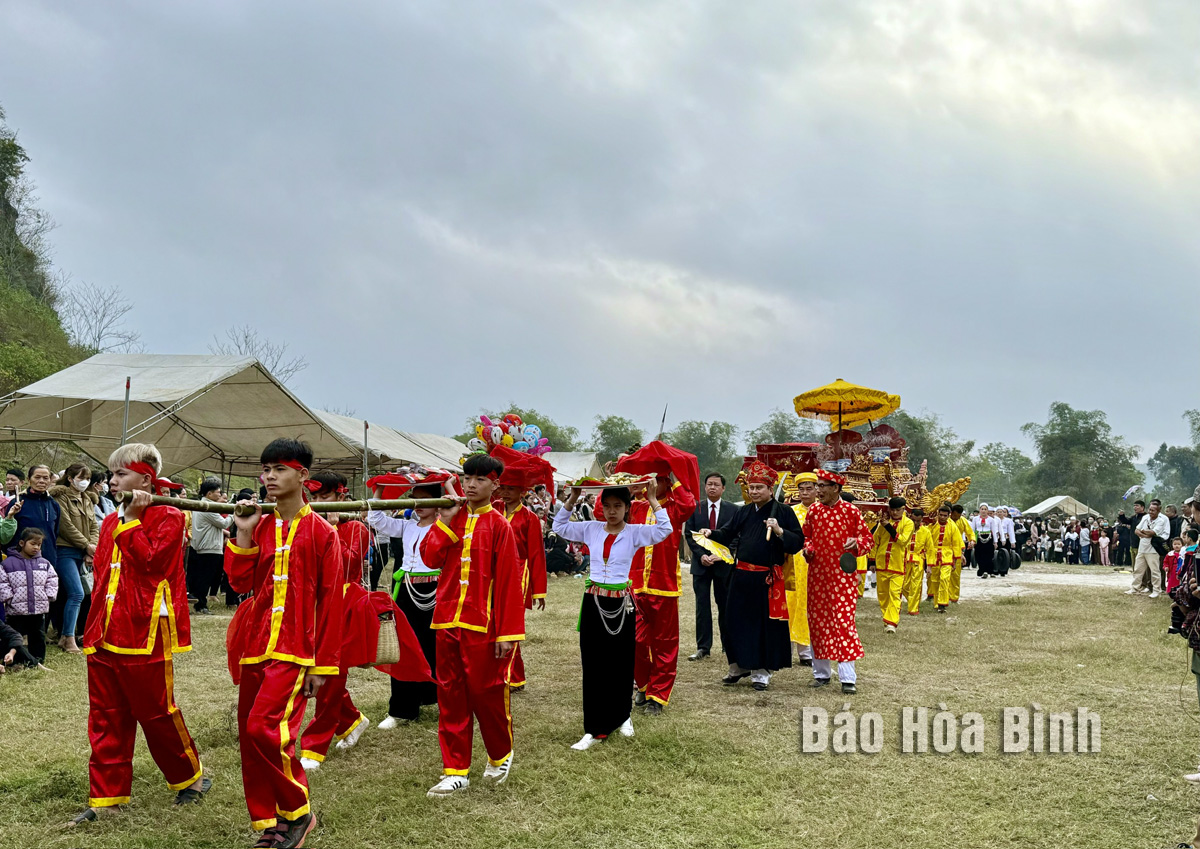
Lac Son district has made enormous efforts in preserving unique cultural values of festivals, helping attract tourists near and far to the locality, especially during the first lunar month of the year.

Since 2018, Buddha Khuu Dung Procession Festival in Nhan
Nghia commune, Lac Son district, has been retraced with several unique cultural
activities.
The festivals meet demands for cultural, spiritual and religious
activities of the locals. Besides, many festival activities with cultural,
artistic, sports and folk games programmes help create a joyful and exciting
atmosphere.
In addition to annual festivals such as Co communal house
festival in Vu Binh commune, Bang temple festival in Ngoc Lau commune, and
Khenh temple festival in Van Son commune, there are special ones held every
three years such as going to the field festival in Yen Phu commune, Du Duong
Voi festival in Vu Ban town, and Buddha Khuu Dung Procession Festival in Nhan
Nghia commune.
Nguyen The Hung, head of Culture and Information office of Lac
Son district, said there are currently 23 archaeological relics, historical and
cultural relics in the locality. In particular, many typical relics with
historical and revolutionary cultural values are associated with festivals with
spiritual and religious values, becoming attractive destinations for tourists
to come to explore and experience indigenous cultural values.
Along with promoting economic, cultural, and social development,
the district has paid attention to the preservation and promotion of cultural
heritage values.
Accordingly, the locality has paid attention to the restoration
of festivals. Since 2020, the district has submitted documents to competent
authorities to recognise three historical and cultural relics at the provincial
level, including Dinh Bang relics in Ngoc Lau commune, Khe temple relics in Van
Son commune, and Khoi temple relics in An Nghia commune.
Besides meeting the spiritual belief needs of the locals and
visitors, festivals are also a healthy cultural environment, contributing to
educate, remind people to treasure hardworking, appreciate production results,
stay united, and help each other to rise.
With an increasingly vibrant and widespread emulation movement aimed at building cultured residential areas and cultured families, Yen Thuy District has been making steady progress toward improving both the material and spiritual well-being of its people, while fostering a civilized, prosperous, beautiful, and progressive community.
Once lacking recreational spaces and community facilities, Residential Group 2 in Quynh Lam Ward (Hoa Binh City) has recently received attention for the construction of a new, spacious, and fully equipped cultural house. The project followed the model of state support combined with public contributions in both labor and funding.
The "All people unite to build cultural life" movement, which has been effectively integrated with Kim Boi district’s socio-economic development goals, is fostering a lively spirit of emulation across local residential areas, hamlets, villages, public agencies, and enterprises. In addition, through the initiative, traditional cultural values are being preserved and promoted, while community solidarity and mutual support in poverty reduction and economic development are being strengthened.
A working delegation of the Hoa Binh provincial People’s Committee led by its Permanent Vice Chairman Nguyen Van Toan on June 11 inspected the progress of a project to build the Mo Muong Cultural Heritage Conservation Space linked to tourism services in Hop Phong commune, Cao Phong district.
Born and growing in the heroic land of Muong Dong, Dinh Thi Kieu Dung, a resident in Bo town of Kim Boi district, in her childhood was nurtured by the sweet lullabies of her grandmother and mother. These melodies deeply imprinted on her soul, becoming an inseparable part of her love for her ethnic group's culture. For over 20 years, this love for her hometown has driven Dung to research, collect, and pass down the cultural values of the Muong people to future generations.
In the final days of May, the Ethnic Art Troupe of Hoa Binh Province organized performances to serve the people in remote, mountainous, and particularly disadvantaged areas within the province. These were not just ordinary artistic shows, but they were the meaningful journeys aimed at spreading cultural values, enhancing the spiritual life of the people and contributing to the preservation of ethnic minority cultural identities.



